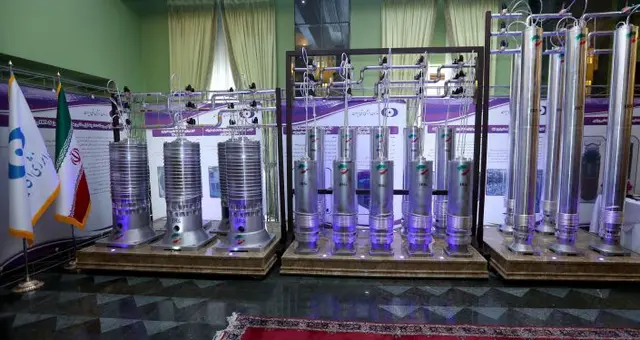Iran struck a deal with the UN nuclear watchdog in February to temporarily salvage part of the extra inspection activities introduced by its 2015 nuclear accord with major powers, which Tehran scaled back in retaliation for reimposed US sanctions after Washington unilaterally pulled out of that agreement in 2018.
Iran's parliament speaker announced on Sunday that the International Atomic Energy Agency (IAEA) will no longer be able to enjoy access to images of the country’s nuclear sites following the expiration of the three-month deal struck between Tehran and the UN nuclear watchdog, reported Iran’s state TV.
"From May 22 and with the end of the three-month agreement, the agency will have no access to data collected by cameras inside the nuclear facilities agreed under the agreement," state TV quoted Mohammad Baqer Qalibaf as saying at parliament’s open session.
No details were offered regarding whether the aforementioned images would be deleted. Qalibaf was cited as adding that Iran's Supreme Leader Ayatollah Ali Khamenei supported the decision.
"Yesterday it was discussed and the decision was made. The law passed by the parliament will be implemented. The Supreme Leader has underlined the importance of this issue as well," said Qalibaf.
The announcement came as the head of the International Atomic Energy Agency (IAEA), Rafael Grossi, is scheduled to hold a news conference on Sunday afternoon.
‘Salvaging’ JCPOA
Rafael Grossi is currently in talks with Iran on extending the monitoring arrangement, concluded in February in an attempt to temporarily salvage “necessary” IAEA inspection and verification of its activities, as presupposed by the Joint Comprehensive Plan of Action (JCPOA).
"(IAEA) Director General Rafael Mariano Grossi and Vice-President of Iran and Head of the Atomic Energy Organisation of Iran, Ali Akbar Salehi, on 21 February agreed on a temporary bilateral technical understanding (for up to 3 months) that remains in effect," the IAEA said in a statement.
"The Agency and Iran are currently in consultations regarding the implementation of the existing understanding. The Director General will provide an update to the (IAEA) Board of Governors in the coming days," it added.
Known commonly as the Iran nuclear deal, the JCPOA was reached in Vienna on 14 July 2015, between the Islamic Republic and the P5+1 (the five permanent members of the United Nations Security Council—China, France, Russia, United Kingdom, United States—plus Germany) together with the European Union, and aims to prevent Tehran from being able to make nuclear arms, which it has repeatedly reiterated it has never wanted to build.
The Additional Protocol is a legal document granting the IAEA complementary inspection authority.
Tehran had begun scaling back cooperation with the IAEA in response to the US reimposing sanctions against the Islamic Republic after then-President Donald Trump unilaterally scrapped the 2015 accord in May 2018.
Under legislation enacted by hardline Iranian lawmakers in 2020, on 21 February the country’s government was obliged to limit IAEA inspections to declared nuclear sites only. Thus, the short-notice, “snap” access to any location seen as relevant for information-gathering would be revoked if other parties did not fully comply with the 2015 deal.
Vienna Talks and Accusations of ‘Economic Terrorism’
The recent developments come against the backdrop of ongoing talks between Tehran and six powers to revive the JCPOA.
Iran’s Deputy Foreign Minister Seyed Abbas Araghchi, who leads the country’s negotiating team in Vienna, recently returned after concluding the fourth round of talks aimed at reviving the 2015 deal. The last meeting of the JCPOA Joint Commission was held on 19 May, with Araghchi saying good progress was made, according to Teheran Times.
“After two weeks of negotiations, we will have a meeting to conclude, and then the delegations will return to the capitals for consultations,” Araghchi told Iran’s state media.
He added:“There are a few key issues that need further review and decision-making in the capitals, and we hope that they will take place in the next few days and that we will be able to conclude on these issues in the next round of talks.”
Meanwhile, on Thursday, Iranian Foreign Minister Mohammad Javad Zarif in a telephone conversation with European Union foreign policy chief Josep Borrell discussed the latest developments pertaining to the Vienna talks.
Zarif criticized Washington’s ongoing “economic terrorism”, reiterating that it was not acceptable for the administration of US President Joe Biden to persist in using sanctions imposed by his predecessor Donald Trump as leverage in the talks.
“A fundamental change in this approach is a sine qua non for the Vienna talks to be fruitful, and this is a political decision that the US president should adopt,” Zarif said.
The Biden administration has been working to return the United States to the 2015 Iran nuclear agreement, with Washington and Tehran currently in a standoff over which party must return to compliance first.
(SPUTNIK)
 简体中文
简体中文

